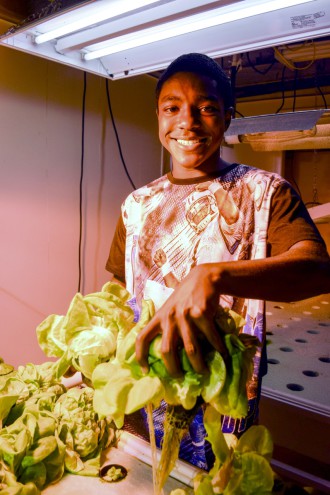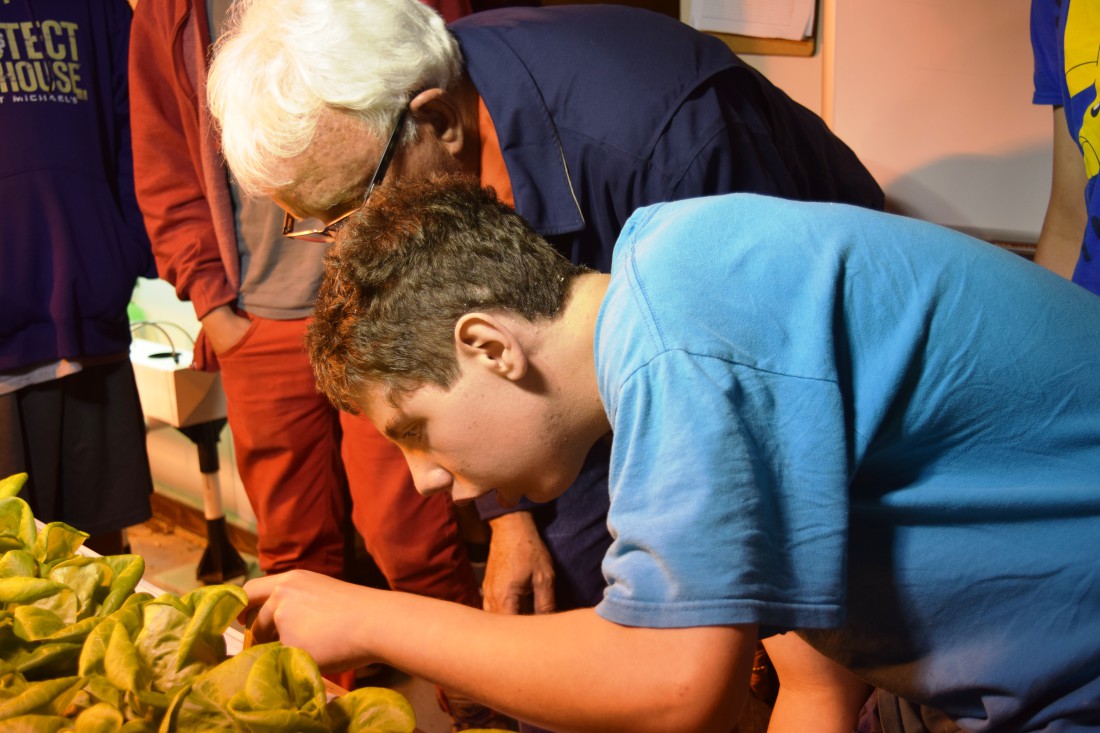It’s morning at Serious Dog Farm: The sun peeks over the horizon, glistening off the dew on the greens growing in the ground, the rooster crows … well, not exactly. Serious Dog is an entirely indoor hydroponic vegetable operation in the heart of the city, located in the renovated greenhouses at Smith Mill Works in West Asheville.
But while it might not look exactly like an idyllic mountain farm, it’s not the cold, mass-production warehouse some folks imagine when they hear the word “hydroponics” either, says owner and operator Sean Wilson.
“If they knew the amount of care and attention to detail that goes into the plants, they’d be really surprised,” he says.
Half scientist, half farmer
By definition, hydroponics is simply a method of growing without soil — plants are provided the nutrients they need directly. Several paths allow growers to achieve this. Wilson uses the deep water culture approach. He has two large ponds outfitted with floating foam rafts; the plants grow through holes in the foam, with their roots suspended in the ponds’ nutrient-rich, oxygenated water. Other hydroponic growers use soilless mediums (see “Small But Mighty,” May 3, Xpress) or spray systems that mist the plants’ roots with necessary nutrients.
Although this sounds water-intensive, it’s actually not. According to Wilson, hydroponics is 90 percent more water-efficient than traditional, soil-based farming.
In fact, that’s what got him excited about hydroponics in the first place. While in the Peace Corps in Ethiopia, Wilson helped women in the village grow plants hydroponically for food security and added income. “Seeing hydroponics work in an environment where there’s really minimal resources really opened my eyes up to the possibilities,” Wilson says.
Wilson acknowledges that cutting out the middle man (aka the ground) does make the growing process somewhat lablike. He checks the nutrient levels daily, making sure they’re just right, and continuously monitors the amount of oxygen in his ponds.
“Doing things hydroponically, I feel like half scientist, half farmer,” Wilson explains. But that’s a good thing, he feels. “I really have full control of every aspect of the growing process. I can see what works and what doesn’t work, and I have really fast feedback,” he says. Heads of lettuce can be ready for harvest in four to six weeks. Not so with soil. What’s more, he can grow crops year-round.
Wilson sums up the process as efficient and, perhaps surprisingly, easy. “I’m doing about 24 heads of lettuce a week, and I’m a one-man operation,” he says. “I think my back would be a lot more sore if I was trying to do that out in the field.”
Sustainable in more ways than one
For these reasons, hydroponics is taking off around the globe, the country and in Western North Carolina.
Although the team at Fifth Season Gardening Co. has promoted the growing method for almost two decades — it opened as the first hydroponics supply store in the Asheville area in 1999 — it has steadily seen increased interest from home growers and has witnessed hydroponics go mainstream for home-scale applications.
“More people want to grow their own food,” notes Kristin Weeks, a managing partner of Fifth Season’s Asheville Market on Tunnel Road with her husband, Mike. “This has meant that compact systems have hit the market with good success.” She says their free hydroponics class is always well-attended.
But it’s not just backyard gardeners who want to reap hydroponics’ impressive list of benefits, from rapid growth rate to less labor to water conservation to crop consistency.
“We’re seeing a huge demand for this technology from all growers, including the home hobby grower, the market farmer, and the large commercial farmer,” says Brook Sheffield, owner and founder of the local farm and garden store LOTUS (Living Only Through Urban Sustainability).
Recently, LOTUS has been working with Eliada, educating its staff on all things hydroponics. The nonprofit, which offers a continuum of services to children in need, began growing hydroponic lettuce, along with a few herbs and other crops, in the basement of a home on its property last year. Eliada was striving to meet a strategic initiative to better provide nutritious food to those under its care.
“The original initiative came from our former CEO,” says Tami Ruckman, director of development. “He said that our future looks a lot like our past.”
That past? A long history of farming. Founded in 1903, Eliada sustained itself as a working farm, with livestock and field crops, until the late 1970s.
“Somewhere along the way, we lost that ability,” Ruckman says. “We became more sophisticated with the kind of treatment we were doing, and some of the activities that had sustained the organization for a long time went by the wayside.”
Eliada has been around 114 years, Ruckman notes. “It’s time that we turned a corner on fundraising and struggling for the next dollar and made ourselves sustainable,” she says.
Go big or go dome

Enter Frank Taylor, Eliada’s chief business development officer, who spearheaded the new hydroponic lettuce operation. With LOTUS’ help, he and his colleagues had a cram session about the growing method. Today, they consider themselves “pretty proficient hydroponic farmers,” producing a couple of hundred heads of lettuce a month. If you compare the original product to what comes out of the basement now, Taylor says, “it’s like a Volkswagen versus a Porsche.”
That’s why Taylor feels confident enough to take the reins of what will soon become Eliada Farms, a separate business that will help sustain Eliada’s programming. Of course, that means moving out of the tiny basement and into a larger space: a 42-foot-wide geodesic dome, to be exact — a design popularized by Buckminster Fuller, who taught at Black Mountain College.
Taylor believes the special “GrowDome” will attract gardeners and architecture enthusiasts alike to the campus; once there, they can learn about what the organization does for the community. “It’s a masthead for what we’re doing for the next century here,” he says. “It shows people that we’re going back to the future.”
In addition to producing vegetables for people on the Eliada campus and vegetables for Eliada Farms to sell, the dome will also serve as an educational center. The children at Eliada love planting and growing, Taylor says. “Everybody wants to be a gardener when it turns the first of April,” he says.
But with conventional growing methods, it takes a long time for the kids to see the results of their efforts once spring arrives — meaning, they get bored. Hydroponics allow them to see activity almost immediately and to experience the entire plant life cycle in roughly a month.
“They have grown their own stuff, and they’ve eaten their own stuff that they’ve grown,” Taylor says. “When you’re one of these kids who’s had nothing … a little thing like that makes a light go on, and it’s pretty fun to watch.”
This summer, 13-year-old Jeremiah, a junior leader at Eliada, worked with Taylor growing lettuce and basil. “It was a lot of fun being able to check the pH balance of the water, finding out how the system worked, how the plants got all their hydration and kept growing,” he says. “I learned determining factors on how high the heat in the room should be for the lettuce to grow.”
If it sounds complicated, Taylor stresses that growing hydroponically is simple once you discover the basics — something anyone can do. The science only adds to the fun, he says, making it possible to grow “really, really high-quality food with no chemicals and a tenth to twentieth of the water over and over again.”
Editor’s note: As the traditional growing season comes to an end, the Farm & Garden section will go dormant and will reappear along with green shoots in the spring.




This is a wonderful project…so proud of all at Eliada who made this possible.
Frank, a good job!!!!!
It would have been nice of this publication to mention New Age Gardens the oldest locally owned and operated store serving the Swannanoa valley with hydroponic and organic gardening supplies since 2002. Having supported the Mountain Xpress for the better part of 15 years with thousands of advertising dollars and articles in which I challenged Cecil Bothwell, a writer for MX in 2002, to try hydroponic gardening as irony would have it he concluded it was a costly failure. I am gratified that the MX now portrays hydroponic gardening favorably but it is worth noting that in fruits grown hydroponically, flavor is compromised and even though there are additives to enhance flavor there are no certifiably organic solutions for hydroponic gardening as yet. Thanks a lot Mountain Xpress for raising the merits of hydroponic gardening while failing to remember those who brought it to your attention so many years ago.